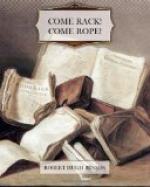* * * * *
The bells ceased at nine o’clock, and upon the moment, a group came round the churchyard wall, down from the field-path and the stile that led to the manor.
First, walking alone, came the squire, swiftly and steadily. His face was flushed a little, but set and determined. He was in his fine clothes, ruff and all; his rapier was looped at his side, and he carried a stick. Behind him came three or four farm servants; then a yeoman and his wife; and last, at a little distance, three or four onlookers.
There was dead silence as he came; the hum of talk died at the corners; the bells’ clamour had even now ceased. It seemed as if each man waited for his neighbour to speak. There was only the sound of the squire’s brisk footsteps on the few yards of cobbles that paved the walk up to the lych-gate. At the door of the church, seen beyond him, was a crowd of faces.
Then a man called something aloud from fifty yards away; but there was no voice to echo him. The folk just watched their lord go by, staring on him as on some strange sight, forgetting even to salute him. And so in silence he passed on.
II
Within, the church murmured with low talking. Already two-thirds of it was full, and all faces turned and re-turned to the door at every footstep or sound. As the bells ceased a sigh went up, as if a giant drew breath; then, once again, the murmuring began.
The church was as most were in those days. It was but a little place, yet it had had in old days great treasures of beauty. There had been, until some ten or twelve years ago, a carved screen that ran across the chancel arch, with the Rood upon it, and St. Mary and St. John on this side and that. The high-altar, it was remembered, had been of stone throughout, surrounded with curtains on the three sides, hanging between posts that had each a carven angel, all gilt. Now all was gone, excepting only the painted windows (since glass was costly). The chancel was as bare as a barn; beneath the whitewash, high over the place where the old canopy had hung, pale colours still glimmered through where, twelve years ago, Christ had sat crowning His Mother. The altar was gone; its holy slab served now as the pavement within the west door, where the superstitious took pains to step clear of it. The screen was gone; part lay beneath the tower; part had been burned; Christ’s Cross held up the roof of the shed where the minister kept his horse; the three figures had been carted off to Derby to help swell the Protestant bonfire. The projecting stoup to the right of the main door had been broken half off.... In place of these glories there stood now, in the body of the church, before the chancel-steps, a great table, such as the rubrics of the new Prayer-Book required, spread with a white cloth, upon which now rested two tall pewter flagons of wine, a flat pewter plate as great as a small dish, and two silver communion-cups—all new. And to one side of this, in a new wainscoted desk, waited worthy Mr. Barton for the coming of his squire—a happy man that day; his face beamed in the spring sunlight; he had on his silk gown, and he eyed, openly, the door through which his new patron was to come.




